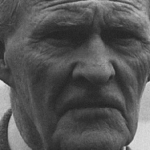Turn left off Henry onto Middagh Street
to see our famous firehouse, home
of Engine 205 and
Hook & Ladder 118 and home also to
the mythic painting “Fire under
the Bridge” decorating
the corrugated sliding door. The painting
depicts a giant American flag
wrinkled by wind
and dwarfing the famous Brooklyn Bridge
as it stretches as best it can
to get a purchase
on Manhattan. In the distance a few dismal
towers and beyond the towers
still another river.
A little deal table holds a tiny American
flag—like the one Foreman held
as he bowed to
receive gold at the ’68 Olympics in Mexico
City—; this actual flag is rooted in
a can of hothouse
roses going brown at the edges and beginning
to shed. There’s a metal collection
box bearing the
names of those lost during the recent burnings.
Should you stop to shake the box—
which is none
of your business—you’ll hear only a whisper.
Perhaps the donations are all
hush money,
ones, fives, tens, twenties, or more likely
there are IOUs and the heart
of Brooklyn
has gone cold from so much asking.
Down the block and across
the street, a man
sleeps on the sidewalk, an ordinary
man, somehow utterly spent,
he sleeps through
all the usual sounds of a Brooklyn noon.
Beside him a dog, a terrier,
its muzzle resting
on crossed paws, its brown eyes wide
and intelligent. Between man
and dog sits
a take-out coffee cup meant to receive,
next to it a picture of Jesus—
actually
a digital, color photograph of the Lord
in his prime, robed and
though bearded
impossibly young and athletic, and—
as always—alone. “Give
what you can,”
says a hand-lettered cardboard sign
to all who pass. If you stand
there long enough
without giving or receiving the shabby,
little terrier will close his eyes.
If you stand
there long enough the air will thicken
with dusk and dust and exhaust
and finally with
a starless dark. The day will become something
it’s never been before, something for
which I have no name.





















Comment form: